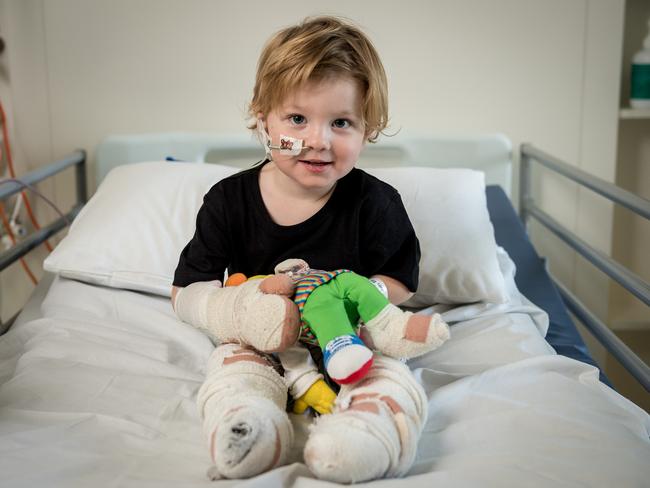Riverside dad Nathan Long says son’s meningococcal could have been avoided
A TASMANIAN dad recalls the day he nearly lost his little boy Arthur to meningococcal disease and asks why it is still happening. TAKE OUR POLL: Should the Government subsidise childhood vaccinations for all strains of the disease?
Tasmania
Don't miss out on the headlines from Tasmania. Followed categories will be added to My News.
IF Arthur Long had been vaccinated against all strains of meningococcal disease, he never would have lost two fingers, his feet and spleen.
“I still can’t believe the same health system that saved Arthur’s life with advanced medical treatment could allow him to contract a vaccine-preventable disease in a first-world country,” his dad Nathan told the Mercury.
“To find out it could have been avoided is sickening. The vaccines are there. Why aren’t they all part of the immunisation program? Not having them is like driving a car without a seat belt.”
BABY BOY DIAGNOSED WITH MENINGOCOCCAL
CORONER TO INVESTIGATE TEEN’S MENINGOCOCCAL DEATH
Arthur, now three, was struck down by meningococcal W in late February last year.
Similarly to other cases the Mercury has reported this week, Arthur’s parents thought he had the flu just hours before the disease “sent his little body off a cliff”.

“It was a Saturday morning. He woke up and he was a bit off but there was nothing that rang alarm bells,” Mr Long said. “We had a doctor visit our home about 4pm and she advised us to give him some paracetamol and ibuprofen. She asked my wife if he was up to date with his vaccinations and she answered yes. In the doctor’s mind that ticked all the boxes, but we now know he’d only been vaccinated against meningococcal C.
“Just hours later, his body went limp, his lips were blue and his limbs were cold.”
FEARLESS SARAH LEAVES MEMORIES TO TREASURE
SECOND CASE OF MENINGOCOCCAL AT THE RHH
Arthur was suffering the onset of meningococcal septicaemia, commonly known as blood poisoning, the most dangerous and deadly type of the acute bacterial infection.
He was rushed from his home in Riverside to the Launceston General Hospital, where he spent the night, before being flown to the Royal Children’s Hospital in Melbourne the next morning.
“We definitely thought we were going to lose him to the disease in those first two days,” Mr Long said.

In the first 24 hours, all of Arthur’s major organs started to fail, due to what doctors called “leaky blood vessels”. His heart struggled to keep up and he was given only a 50 per cent chance of surviving open-heart surgery.
Mr Long said without timely critical intervention his son would have been dead.
Arthur remained in the Royal Children’s for four months, where doctors eventually made the decision to amputate both his feet and two fingers from his right hand.
“They were gone, there was no saving them,” Mr Long said.
“During the septic stage of the disease there was a lack of tissue infusion and blood circulation, which meant all the cells had died.”
RISE IN REQUESTS FOR MENINGOCOCCAL VACCINATIONS
CHILLING LESSON IN MUM’S MENINGOCOCCAL NIGHTMARE
Arthur will forever require prosthetic legs, but his dad said the family still had a lot to be grateful for.
“Realistically, it hasn’t had any negative effects on his livelihood yet,” Mr Long said.
“It hasn’t stopped him from being a typical little kid. He lost two fingers off his right hand, but it’s still very useful to him and he’s awesome on his prosthetics. He can even jump.”
In 2017, there were 382 cases of meningococcal reported nationally and 28 deaths.
Prior to this year, infants aged 12 months were only given a single-strain meningococcal C vaccine, but after the spike in other strains the Federal Government introduced a ACWY meningococcal vaccine at 12 months through the national immunisation program.
The Tasmanian Government also funded a free meningococcal ACWY vaccine for teenagers who were born between August 1, 1997, and April 30, 2003.
Meningococcal B is currently the only main strain of meningococcal that isn’t part of a vaccination program, costing parents up to $300 per child.
Mr Long said neither he nor his wife Carly were ever told about the different meningococcal vaccinations on the market.
“Carly and I were pissed off that a GP never brought them up,” he said.
“We were absolutely oblivious to its existence. If you’re child is sick, always ask the medical professional to confirm that it isn’t meningococcal or meningitis.
“There should be advertisements in every GP clinic that say ‘Does your child have their ACWY and B meningococcal vaccine?’
“The Government might not want to fork out the cash for the vaccines, but how much does a case like my son’s cost the community? How many vaccines could all that money buy?”
MPS JOIN CALLS FOR MENINGOCOCCAL B TO BE ON PBS
Babies and children up to the age of five account for two-thirds of all meningococcal cases, according to Meningococcal Australia.
The disease is transmitted via mucus and generally requires close and prolonged contact with a person carrying the bacteria.


